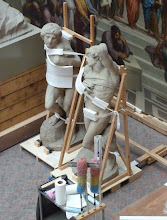Some aspects of the staging were wonderfully effective and memorable, although the train did seem a little odd: a fabulous bit of theatre but it seemed somehow 'stuck on' and unnecessary. Stylistically it was so much more impressionistic than the rest. I 'got' the evocation of the industrial age, the power of steam, the clamour of modernity, the monstrous-ness and strangeness, as seen through the frightened creature's eyes, seeing a train - and the seamy, teaming urban streets (of where?) for the first time. But despite all that it still seemed gimmicky.
I loved the use of the revolve, and the huge bits of scenery that rose while rotating - reminding me of Windy Miller et al emerging from the musical box in Camberwick Green
I must read the original novel to get a sense of how the adaptation remained true to it or shifted towards the playwright's own concerns.
I think it's from the book - the oddly 'anti-science' / daring to take on God's role slant - odd since Mary's lover / soon to be husband Shelley was staunchly atheistic, and Mary herself was certainly enlightened - the daughter of two radical and exceptional parents, who taught her to be a free-thinker.
Victor in the play (and novel?) seems deeply unsympathetic and flawed. Driven by pride, unable to foster normal loving relationships. The beginning of the play is also frustrating because Victor isn't 'active' in the creation of the creature - it happens in his absence - almost as if the lever clicked accidentally when he wasn't intending it, and lo, the creature emerges, solo, birthing itself. In terms of the drama it's an uncomfortable compromise - a fabulous un-worded sequence of him learning to use his body. But at the cost of a crucial aspect - Victor's agency, his responsibility, his creatorship (which is later asserted over and over again) And his momentary appearance, just to throw a cloak and exit, is clumsy dramatically. Didn't like that either.
The theme I found very interesting was the nature/nurture one: a blank slate of a human treated appallingly and becoming a murderer as a result. The burning of the cottage with the family inside, was linked to his reading of what heroes of old do when they are wronged - he seeks violent revenge, following their model (this was clearer with BC as the creature)
Another aspect that popped out for me was the treatment of disabled/disfigured people. We may like to think we are so much better now - that the reactions to the creature's appearance were backward and intemperate - scarcely believeable even. But I wonder. Those who look odd, different, ugly - they do experience terrible rejection. The child, Victor's brother, isn't innocently immune from this - he is just as repulsed.
Elizabeth is the only sighted person who tries to be more accepting. Ironically, her very 'right on' attempt proves to be too late, too naive...too dangerous!
The arguments about slavery versus freedom, mastery with or without responsibility, rights, and about choice or lack of choice, about designing a person to fulfill the needs of another person - these are all fascinating to me. The (voiceless) female creature - created and then, at the last moment, destroyed by Victor: would she have loved the creature back or rejected him? Would they have bred? And if they had, why did Victor assume that this would be abhorrent - and why call them a new species - why not just reanimated humans, producing normal human babies? Why assume the female would be fertile anyway? - presumably because the knowledge of the time did not include such details of how the conception process comes about, and how sterilisation works.
I particularly like the bit when Elizabeth challenges Victor when he explains that he had made a man - asking him why he hadn't married her years ago and created a human the normal way, by giving her a baby!
I found the scene between the creature and Elizabeth shocking and upsetting - properly so.
(this piece is somewhat unfinished but I'm going to post it as it is)

No comments:
Post a Comment